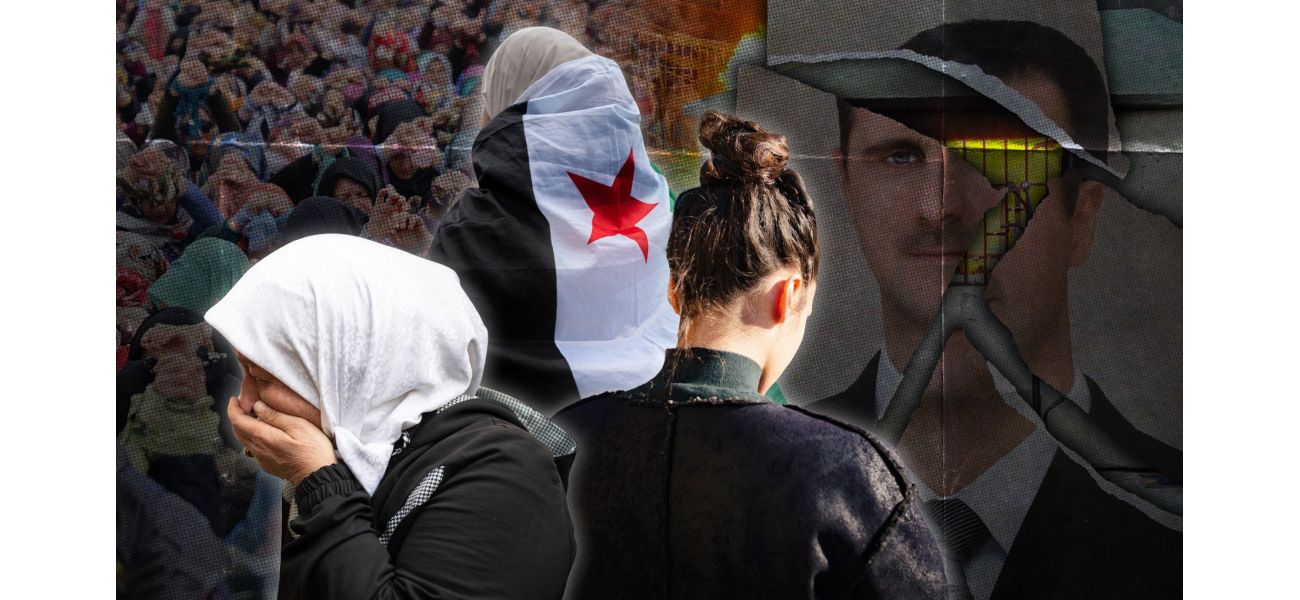Syrian civilians have been greatly affected by years of sexual violence, and their future is uncertain.
Assad's toolbox of terror included not only deadly tactics, but also the sinister weapon of rape.
December 14th 2024.

During the 13 years of civil war in Syria, the government led by Bashar al-Assad used various deadly tactics to control and terrorize its citizens. From nerve agents to chlorine barrel bombs and mustard gas, innocent civilians were constantly living in fear and danger. However, in addition to these brutal methods, another sinister weapon was also being used – rape.
It is estimated that thousands of men, women, and children were sexually abused by Assad's forces during the war. A report from the Euro-Mediterranean Human Rights Network in 2013 revealed that around 6,000 women had been raped, and the number was increasing. Even after seeking refuge abroad, Syrians who returned home were still subjected to detention, disappearance, and torture, including sexual violence, as reported by Amnesty International in 2021.
Rape, often referred to as the "cheapest weapon known to man" by veteran journalist Christina Lamb, was used as a tool to instill fear, degrade, and enforce a strict social order in a time of chaos, according to the UN High Commissioner for Human Rights in 2018. Although Assad has now been ousted from power, the future of Syria and the survivors of sexual violence during the war remain uncertain under the new government led by group Hayat Tahrir al-Sham.
There are still many reasons for women in Syria to fear, even after the government's collapse. As Christina Lamb explains, there is a sense of uncertainty about what comes next and who will be in charge. Moreover, rape is a crime where the survivor is often made to feel like they have done something wrong, and this is especially true in times of conflict. Unfortunately, accountability for such acts is rare.
According to Lubna Alkanawati, executive director of the non-profit organization Women Now for Development, gender-based violence, including sexual violence, does not simply end with the fall of a regime. It is a deep-rooted issue that is tied to systemic inequalities and will persist unless adequately addressed. The long-lasting impact of sexual violence cannot be overstated as it not only traumatizes the survivors but also perpetuates cycles of fear, control, and societal fragmentation. Addressing this issue requires a comprehensive and sustained effort to break the silence, reduce stigma, and provide support for survivors while holding perpetrators accountable.
For those who have been victims of rape, whether recently or in the past, there is help and support available. If you are still at risk, it is crucial to call 999 and ask for the police. Otherwise, the first step is to go somewhere safe. If you want to report the rape to the police, you can call 999 or the non-emergency line on 101. An Independent Sexual Violence Advocate can assist you through the reporting process, and you can withdraw from the criminal justice process at any time. If possible, try not to wash your clothes or shower before seeking medical help as this can preserve any DNA evidence left by the attacker.
If you do not want to contact the police, you can speak to someone you trust or call one of the UK's rape and sexual assault helplines. The Rape Crisis support line is available 24/7 for anyone aged 16 and over, and you can also start an online chat for support. If you have been injured, it is best to go to the nearest A&E for medical treatment. If you are uninjured, you can go to the nearest Sexual Assault Referral Centre, and you can find information on where to locate one through the NHS website.
Even for historic cases of rape, there is still support available, including from the police. There is no time limit for reporting, and your account can still be used as evidence. As Lauren Aarons, senior adviser on Gender, Conflict, and International Justice with Amnesty International, states, global conflict can be a disaster for women's rights. Moving forward, it is crucial that women's rights are fully guaranteed, and they are equally represented in Syria's new governance structures. Even after surviving the horrific ordeal of rape, survivors may still be subjected to other harms, such as having a family member who has been disappeared into the system of detention. These issues must also be addressed for survivors to fully recover. As a form of torture and a crime against humanity, sexual violence must not be tolerated, and the survivors must receive the support and justice they deserve.
During the 13 years of civil war in Syria, the Assad regime used various deadly tactics to control and intimidate civilians who opposed their government. Nerve agents, chlorine barrel bombs, and mustard gas were all employed to strike fear into the hearts of those who dared to speak out against Bashar al-Assad. But these were not the only heinous weapons used – rape was also used as a tool of terror.
It is estimated that thousands of men, women, and children were subjected to sexual violence by Assad's forces during the war. In a report published in 2013, the Euro-Mediterranean Human Rights Network stated that approximately 6,000 women had been raped, and the number was only increasing. Even after seeking refuge abroad and returning home, Syrians were still not safe from detention, disappearance, and torture, including sexual violence, according to a 2021 study by Amnesty International.
Rape, often referred to as the "cheapest weapon known to man" by veteran journalist Christina Lamb, was used to instill fear, humiliate, and maintain control over the population during a time of chaos. In 2018, the UN High Commissioner for Human Rights acknowledged that it was a deliberate tactic used by the Assad regime. While Assad has now been overthrown, the future remains uncertain for Syria and its survivors of sexual violence.
Christina Lamb explained that there is still much to fear for women in Syria, even after the collapse of the regime. The end of over 50 years of dictatorship by one family may seem like a cause for celebration, but there is a sense of uncertainty about what comes next and who will be in charge. In many cases, survivors of sexual violence are made to feel like they have done something wrong, and this is especially true in times of conflict. There is often a lack of belief that anything will be done to address these crimes, and accountability is rare.
Lubna Alkanawati, executive director of the non-profit organization Women Now for Development, emphasized that gender-based violence, including sexual violence, does not simply end with the fall of a regime. It is a deep-rooted issue that is tied to systemic inequalities and will persist unless it is properly addressed. The consequences of sexual violence are far-reaching, not only causing personal trauma for survivors but also perpetuating cycles of fear, control, and societal fragmentation.
To address this issue, a comprehensive and sustained effort is needed to break the silence, reduce stigma, and provide support for survivors while holding perpetrators accountable. If you have been the victim of rape, there is help available. If you are in immediate danger, call 999 and ask for the police. Otherwise, the first step is to go somewhere safe.
Reporting the crime to the police can be daunting, but there are support services available to guide you through the process. An Independent Sexual Violence Advocate can assist you with reporting, and you can still choose to withdraw from the criminal justice process at any time. If you do decide to report to the police, try not to wash your clothes or shower before seeking medical attention, as this can help preserve evidence.
If you do not want to contact the police, you can talk to someone you trust about what has happened or reach out to one of the many rape and sexual assault helplines available in the UK. The Rape Crisis support line is open 24/7 and can be reached at 0808 500 2222, or you can start an online chat.
If you have been injured, it is best to go to your nearest A&E for medical treatment. If you are uninjured, you can go to your nearest Sexual Assault Referral Centre, and the NHS has information on where to find one. It is important to note that there is no time limit for reporting historic rape, and support is still available, including from the police.
Lauren Aarons, a senior adviser on Gender, Conflict, and International Justice with Amnesty International, highlighted that global conflict can have devastating consequences for women's rights. Moving forward, it is crucial that women's rights are guaranteed and that they are equally represented in Syria's new government structures. Even after surviving sexual violence, survivors may still be subjected to other harms, such as having a family member who has been disappeared. It is vital that these issues are also addressed for survivors to fully heal. Sexual violence is not only a crime against humanity but also a form of torture, and it is essential that it is recognized and addressed as such.
It is estimated that thousands of men, women, and children were sexually abused by Assad's forces during the war. A report from the Euro-Mediterranean Human Rights Network in 2013 revealed that around 6,000 women had been raped, and the number was increasing. Even after seeking refuge abroad, Syrians who returned home were still subjected to detention, disappearance, and torture, including sexual violence, as reported by Amnesty International in 2021.
Rape, often referred to as the "cheapest weapon known to man" by veteran journalist Christina Lamb, was used as a tool to instill fear, degrade, and enforce a strict social order in a time of chaos, according to the UN High Commissioner for Human Rights in 2018. Although Assad has now been ousted from power, the future of Syria and the survivors of sexual violence during the war remain uncertain under the new government led by group Hayat Tahrir al-Sham.
There are still many reasons for women in Syria to fear, even after the government's collapse. As Christina Lamb explains, there is a sense of uncertainty about what comes next and who will be in charge. Moreover, rape is a crime where the survivor is often made to feel like they have done something wrong, and this is especially true in times of conflict. Unfortunately, accountability for such acts is rare.
According to Lubna Alkanawati, executive director of the non-profit organization Women Now for Development, gender-based violence, including sexual violence, does not simply end with the fall of a regime. It is a deep-rooted issue that is tied to systemic inequalities and will persist unless adequately addressed. The long-lasting impact of sexual violence cannot be overstated as it not only traumatizes the survivors but also perpetuates cycles of fear, control, and societal fragmentation. Addressing this issue requires a comprehensive and sustained effort to break the silence, reduce stigma, and provide support for survivors while holding perpetrators accountable.
For those who have been victims of rape, whether recently or in the past, there is help and support available. If you are still at risk, it is crucial to call 999 and ask for the police. Otherwise, the first step is to go somewhere safe. If you want to report the rape to the police, you can call 999 or the non-emergency line on 101. An Independent Sexual Violence Advocate can assist you through the reporting process, and you can withdraw from the criminal justice process at any time. If possible, try not to wash your clothes or shower before seeking medical help as this can preserve any DNA evidence left by the attacker.
If you do not want to contact the police, you can speak to someone you trust or call one of the UK's rape and sexual assault helplines. The Rape Crisis support line is available 24/7 for anyone aged 16 and over, and you can also start an online chat for support. If you have been injured, it is best to go to the nearest A&E for medical treatment. If you are uninjured, you can go to the nearest Sexual Assault Referral Centre, and you can find information on where to locate one through the NHS website.
Even for historic cases of rape, there is still support available, including from the police. There is no time limit for reporting, and your account can still be used as evidence. As Lauren Aarons, senior adviser on Gender, Conflict, and International Justice with Amnesty International, states, global conflict can be a disaster for women's rights. Moving forward, it is crucial that women's rights are fully guaranteed, and they are equally represented in Syria's new governance structures. Even after surviving the horrific ordeal of rape, survivors may still be subjected to other harms, such as having a family member who has been disappeared into the system of detention. These issues must also be addressed for survivors to fully recover. As a form of torture and a crime against humanity, sexual violence must not be tolerated, and the survivors must receive the support and justice they deserve.
During the 13 years of civil war in Syria, the Assad regime used various deadly tactics to control and intimidate civilians who opposed their government. Nerve agents, chlorine barrel bombs, and mustard gas were all employed to strike fear into the hearts of those who dared to speak out against Bashar al-Assad. But these were not the only heinous weapons used – rape was also used as a tool of terror.
It is estimated that thousands of men, women, and children were subjected to sexual violence by Assad's forces during the war. In a report published in 2013, the Euro-Mediterranean Human Rights Network stated that approximately 6,000 women had been raped, and the number was only increasing. Even after seeking refuge abroad and returning home, Syrians were still not safe from detention, disappearance, and torture, including sexual violence, according to a 2021 study by Amnesty International.
Rape, often referred to as the "cheapest weapon known to man" by veteran journalist Christina Lamb, was used to instill fear, humiliate, and maintain control over the population during a time of chaos. In 2018, the UN High Commissioner for Human Rights acknowledged that it was a deliberate tactic used by the Assad regime. While Assad has now been overthrown, the future remains uncertain for Syria and its survivors of sexual violence.
Christina Lamb explained that there is still much to fear for women in Syria, even after the collapse of the regime. The end of over 50 years of dictatorship by one family may seem like a cause for celebration, but there is a sense of uncertainty about what comes next and who will be in charge. In many cases, survivors of sexual violence are made to feel like they have done something wrong, and this is especially true in times of conflict. There is often a lack of belief that anything will be done to address these crimes, and accountability is rare.
Lubna Alkanawati, executive director of the non-profit organization Women Now for Development, emphasized that gender-based violence, including sexual violence, does not simply end with the fall of a regime. It is a deep-rooted issue that is tied to systemic inequalities and will persist unless it is properly addressed. The consequences of sexual violence are far-reaching, not only causing personal trauma for survivors but also perpetuating cycles of fear, control, and societal fragmentation.
To address this issue, a comprehensive and sustained effort is needed to break the silence, reduce stigma, and provide support for survivors while holding perpetrators accountable. If you have been the victim of rape, there is help available. If you are in immediate danger, call 999 and ask for the police. Otherwise, the first step is to go somewhere safe.
Reporting the crime to the police can be daunting, but there are support services available to guide you through the process. An Independent Sexual Violence Advocate can assist you with reporting, and you can still choose to withdraw from the criminal justice process at any time. If you do decide to report to the police, try not to wash your clothes or shower before seeking medical attention, as this can help preserve evidence.
If you do not want to contact the police, you can talk to someone you trust about what has happened or reach out to one of the many rape and sexual assault helplines available in the UK. The Rape Crisis support line is open 24/7 and can be reached at 0808 500 2222, or you can start an online chat.
If you have been injured, it is best to go to your nearest A&E for medical treatment. If you are uninjured, you can go to your nearest Sexual Assault Referral Centre, and the NHS has information on where to find one. It is important to note that there is no time limit for reporting historic rape, and support is still available, including from the police.
Lauren Aarons, a senior adviser on Gender, Conflict, and International Justice with Amnesty International, highlighted that global conflict can have devastating consequences for women's rights. Moving forward, it is crucial that women's rights are guaranteed and that they are equally represented in Syria's new government structures. Even after surviving sexual violence, survivors may still be subjected to other harms, such as having a family member who has been disappeared. It is vital that these issues are also addressed for survivors to fully heal. Sexual violence is not only a crime against humanity but also a form of torture, and it is essential that it is recognized and addressed as such.
[This article has been trending online recently and has been generated with AI. Your feed is customized.]
[Generative AI is experimental.]
0
0
Submit Comment





